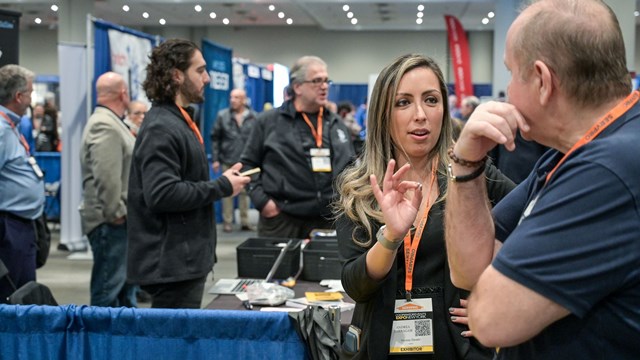Remember your first day at a new school? Most likely, you didn’t know a soul, had no idea what the students were learning and you probably felt nervous, intimidated or maybe even afraid. In most cases, this is what it’s like to be a new board member. A newcomer walks into a meeting for the first time, may or may not know a fellow neighbor volunteer, has no idea what is or has been discussed, and is clueless about ongoing disputes, group politics, or alliances. Getting elected to an association’s board is a big job, and new members can often find themselves unsure of what they've gotten themselves into.
The Buddy System
To help a new student calm their jitters and get them up to speed of the others, a teacher will often appoint a current student to show the newbie around, share books, introduce him or her to other students and give them the lay of the land. It’s a great concept to follow when new members come on board.
“Newcomers should really take the time to speak to the existing board members because they are welcome knowledge,” says Kevin Carroll, president of Lang Management in Boca Raton. “They will gain a history of the property and the association, including current projects and decisions made relating to the association so they know where things stand. They’ll also learn about what challenges are.”
An incoming new board member should also be given a copy of all essential documents and resolutions to review, including bylaws, house rules, policies the board has adopted, subletting policies, etc.
As of July 1, 2010, newly-elected or appointed directors must complete an educational course certified by the Florida Department of Business and Professional Regulation (DBPR) or sign a statement that they have read Florida Statutes Chapter 718 and all of their community's governing documents within 90 days of being elected or appointed to the board.
The law also states that ‘he or she will work to uphold such documents and policies to the best of his or her ability; and that he or she will faithfully discharge his or her fiduciary responsibility to the association’s members.’ Any director who fails to file the written certification or educational certificate on time will be suspended from service until he or she complies. (The law only covers condo board members—not those serving on homeowners boards.) Recertification is not required if the director serves on the board without interruption.
Eric Glazer, Esq. of Glazer & Associates PA in Hollywood believes the law has at least one flaw: "You can become certified by merely signing an affidavit that you read Florida Statute 718 and all your governing documents," says Glazer, who runs a popular radio show about condos in South Florida. "The truth is, nobody knows if you did or you didn't, and even if you did, it doesn't mean you understand it. The law should mandate attendance at a seminar where the basics of [the law] can be learned and discussed."
The minutes of the meetings will show the newcomer, minute by minute, what happened during each meeting. They can then take time to digest the information and ask any questions based on what already has been discussed.
“When a new board member comes on to serve his impetus is that he can change things and do things better—when in fact he doesn’t understand the idiosyncrasies to get to that point,” says Dominick Scannavino, CMCA, the president and CEO of Management & Associates in Oldsmar. “It might require a membership vote, or change in the bylaws. These are things that are a learning process and the older board members have a lot of info stored that can be shared with the new board members.”
In addition to reviewing the documents, the veterans can also give the rookies a working knowledge of the building, its occupants, problems and needs. A tour of the building can also be a very educational experience for the new member.
Getting Personal
Unfortunately, while some neophytes come in eager to learn and help and have no other agenda, others start their term with their own agendas and some major misconceptions on how the board operates. “Some board members get on the board because they have misconceptions of the current board and how they vote,” says Carroll. “They might not be looking out for the board’s best interest. Overall, the board members work together and make decisions and don’t have a hidden agenda.”
Newbies should also understand their roles and responsibilities and should be brought up to speed on how meetings are actually run. One way to do that is to refer them to Robert’s Rules of Order, which spells out in explicit detail how to run a meeting, from the proper way of introducing a new item of business, voting on it, and closing the floor for discussion.
Because new members are voted in, they also may come to the table with a misleading sense of power. Although the board of directors act as a governing body for the condominium, and thanks to Chapter 718, they have power to control what is permitted to take place and not take place in the individual units and the common areas. Uneducated board members may take this sense of power to a new level.
In the excitement of being a new board member, it’s also important for them to know what they can and cannot say. There are many resources available to new board members to become oriented on how the board is run.
“I’m also the president of the council of neighborhood association in Pasco County,” says Scannavino. “These are organizations that provide education and speakers related to the communities and more.”
Keep Current
New board members should try to keep up to date on industry news and laws and they can find tips on running a successful board by reading trade publications such as The South Florida Cooperator. The Community Associations Institute (CAI)—there are seven active chapters in Florida—is another valuable resource for new and existing board members and property managers. The CAI (www.caionline.org) is an international organization dedicated to building better communities, provides education and resources to community association homeowner leaders, professional managers, association management companies and other businesses and professionals, who provide products and services to community associations. Dozens of Florida management and legal firms and private organizations offer a comprehensive slate of state-approved instructional courses and seminars for new board members. [See Sidebar]
One of those, C.A.M. Academy and Consulting Services Inc., (www.camacademy.org) in Sarasota offers a half-day (4-hour) course that provides training in the real life operation of community management. Course topics relate to the various segments of managing community associations.
Both Glazer and Donna DiMaggio Berger through their respective law firms also offer board member certification coursework. The Community Advocacy Network in conjunction with KGB run a well-attended “Board Member Boot Camp” each year and their “Board Member Basics 2-hour courses will take place at the KGB campus in Margate on August 22 and September 19. Contact them at www.kgblawfirm.com for further information. Glazer & Associates P.A. offers two seminars at their state-of-the-art media center in Miramar. Contact them for further details at www.condo-laws.com.
Of course, a board member can always turn to its support staff too, especially when it comes to legal matters. “When it comes to true legal matters, the board is going to depend upon their legal counsel,” says Carroll. “Board members shouldn’t shy away from serving on a board because they don’t have a legal background. We’ll guide them to make a decision.”
Most importantly, like the new kid in school, if you’re a newbie don’t be afraid to raise your hand and ask questions. Remember, all board members were newbies when they came onto the board. Serving on a board is a volunteer job and members give up a chunk of their free time to make sure the condo or co-op association is run smoothly. They may even take on other volunteer tasks that require more of their time, such as president, vice president, treasurer or secretary. They have to attend meetings, make decisions and, at times, go against the popular vote in order to do what’s right for the association. Not everyone wants to volunteer for this thankless job, so it’s important to make a new board member feel as welcome and informed as you can.
Lisa Iannucci is a freelance writer and a frequent contributor to The South Florida Cooperator.





Leave a Comment